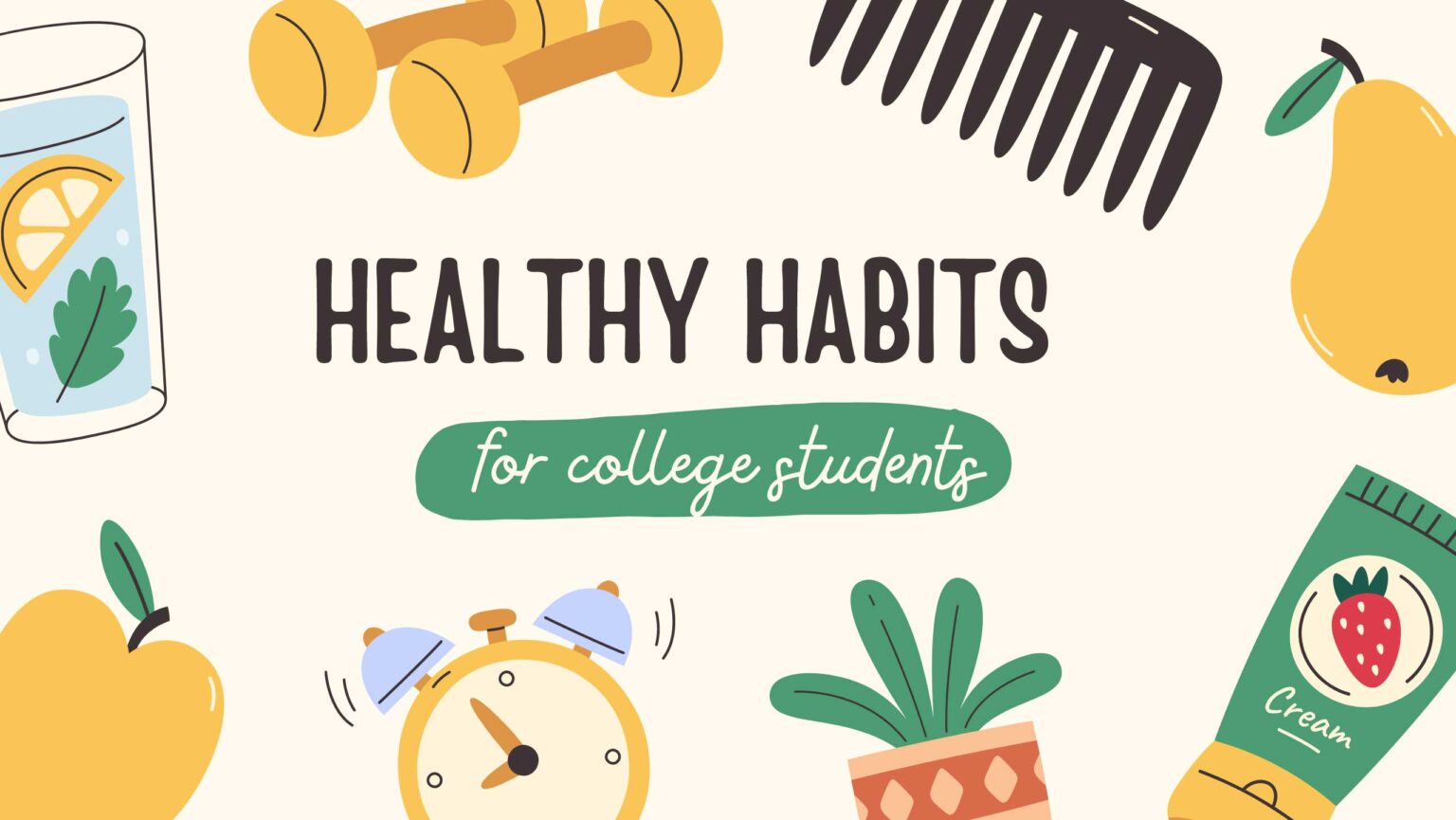College life is an exciting time filled with new experiences, challenges, and opportunities for personal growth.
However, it can also be a period of stress and unhealthy habits if not managed properly if you don’t have healthy habits for college students.
As students navigate through classes, exams, and social activities, maintaining healthy habits is crucial for both academic success and overall well-being.
This guide aims to provide college students with practical tips and strategies to establish and maintain healthy wellness habits throughout their college journey.
From nutrition and exercise to mental health and time management, these tips will help students thrive in their college environment!
Let’s get started!
Table of Contents
- 8 Big Healthy Habits for College Students
- 1. Nutrition: Fueling Your Body and Mind
- 2. Exercise: Staying Active for Health and Happiness
- 3. Sleep: Prioritizing Rest for Better Performance
- 4. Mental Health: Supporting Emotional Well-being
- 5. Time Management: Balancing Responsibilities and Activities
- 6. Social Connections: Building a Supportive Network
- 7. Avoiding Harmful Behaviors: Staying Safe and Healthy
- 8. Financial Health: Managing Your Finances Wisely
- Conclusion
8 Big Healthy Habits for College Students

1. Nutrition: Fueling Your Body and Mind
Eat a Balanced Diet
Eating a balanced diet is fundamental to staying healthy in college. A well-rounded diet provides the energy and nutrients needed for optimal brain function and physical health.
- Fruits and Vegetables: Incorporate a variety of fruits and vegetables into your meals. They are rich in vitamins, minerals, and antioxidants that boost immunity and overall health.
- Lean Proteins: Include lean proteins like chicken, fish, beans, and tofu. Proteins are essential for muscle repair and growth.
- Whole Grains: Choose whole grains such as brown rice, whole wheat bread, and oats. They provide sustained energy and fiber for digestion.
- Healthy Fats: Consume healthy fats from sources like avocados, nuts, and olive oil. These fats support brain function and heart health.
Start Your Day with a Nutritious Breakfast
A nutritious breakfast sets the tone for the day and improves concentration and performance in classes.
- Quick Breakfast Ideas: Try oatmeal with fruits, yogurt with granola, or a smoothie with spinach and protein powder for a quick and nutritious start to your day.
Stay Hydrated
Proper hydration is essential for maintaining energy levels and cognitive function.
- Drink Water: Aim for at least 8 glasses of water a day. Carry a reusable water bottle to stay hydrated throughout the day.
- Limit Sugary Drinks: Reduce the intake of sugary drinks and caffeine, as they can lead to energy crashes and dehydration.
Plan Your Meals
Meal planning can help you make healthier choices and avoid the temptation of fast food.
- Grocery Shopping Tips: Create a shopping list and stick to it. Stock up on healthy snacks like fruits, nuts, and yogurt.
- Cook at Home: Cooking at home allows you to control the ingredients and portion sizes of your meals.
Also Read; Eating Healthy As A Vegetarian Or Vegan Student
2. Exercise: Staying Active for Health and Happiness

Make Time for Regular Exercise
Regular physical activity is essential for maintaining physical and mental health.
- Find Activities You Enjoy: Choose activities you enjoy, such as jogging, cycling, dancing, or yoga. This makes it easier to stay motivated and consistent.
- Set a Schedule: Incorporate exercise into your daily routine, whether it’s a morning jog or an evening gym session.
Join College Sports or Clubs
Participating in sports or fitness clubs is a great way to stay active and meet new people.
- Intramural Sports: Join intramural sports teams for a fun and social way to stay fit.
- Fitness Classes: Many colleges offer fitness classes such as Zumba, pilates, or kickboxing. Take advantage of these offerings.
Incorporate Movement into Your Day
Find small ways to incorporate movement into your daily routine, especially if you have a busy schedule.
- Walk or Bike to Class: Opt for walking or biking instead of driving or taking the bus.
- Use the Stairs: Choose stairs over elevators to add extra steps to your day.
- Take Active Breaks: During study sessions, take short breaks to stretch or do a quick workout.
Related; Top 10 Wellness Tips for College Students
3. Sleep: Prioritizing Rest for Better Performance

We students don’t have enough time to do things we want right? and even for sleep…
If you want to learn how to sleep better then follow these steps to increase your daily performance.
Aim for 7-9 Hours of Sleep
Adequate sleep is crucial for cognitive function, memory, and overall health.
- Create a Sleep Schedule: Establish a consistent sleep schedule by going to bed and waking up at the same time each day.
- Limit Screen Time Before Bed: Avoid screens at least an hour before bed to improve sleep quality.
Create a Sleep-Conducive Environment
A comfortable sleep environment can enhance the quality of your rest.
- Dark and Quiet Room: Use blackout curtains and earplugs to minimize light and noise.
- Comfortable Bedding: Invest in comfortable bedding to make your sleeping environment inviting.
Avoid All-Nighters
All-nighters can disrupt your sleep schedule and negatively impact your performance.
- Plan Ahead: Avoid cramming by planning your study sessions in advance. Break down tasks into manageable chunks.
4. Mental Health: Supporting Emotional Well-being

Practice Stress Management
College life can be stressful, but effective stress management techniques can help you cope.
- Mindfulness and Meditation: Practice mindfulness and meditation to reduce stress and improve focus. Apps like Headspace can guide you through meditation exercises.
- Deep Breathing Exercises: Incorporate deep breathing exercises into your routine to calm your mind and body.
Seek Support When Needed
Don’t hesitate to seek support if you’re feeling overwhelmed or struggling with mental health issues.
- Counseling Services: Take advantage of college counseling services for professional support and guidance.
- Talk to Friends and Family: Reach out to friends and family for emotional support and encouragement.
Set Realistic Goals
Setting realistic goals can prevent unnecessary stress and anxiety.
- SMART Goals: Use the SMART (Specific, Measurable, Achievable, Relevant, Time-bound) framework to set achievable goals.
- Celebrate Achievements: Celebrate your accomplishments, no matter how small, to boost motivation and self-esteem.
Also Read; Best Emotional Support Animals For Students
5. Time Management: Balancing Responsibilities and Activities

Create a Schedule
Effective time management is key to balancing academics, social life, and personal time.
- Use a Planner: Use a planner or digital calendar to organize your tasks, deadlines, and commitments.
- Prioritize Tasks: Prioritize tasks based on urgency and importance. Tackle high-priority tasks first.
Avoid Procrastination
Procrastination can lead to stress and last-minute rushes. Combat procrastination with these strategies:
- Break Tasks into Smaller Steps: Divide larger tasks into smaller, manageable steps to make them less overwhelming.
- Set Deadlines: Establish deadlines for each task and hold yourself accountable.
Balancing academics and social activities is important for a fulfilling college experience.
- Set Boundaries: Set boundaries to ensure you have time for both study and leisure.
- Stay Flexible: Be flexible and adaptable to changes in your schedule or unexpected events.
Related; Smart Time Management Tips and Strategies
Engage in Campus Activities
Participating in campus activities helps you build a supportive social network and make new friends.
- Join Clubs and Organizations: Join clubs and student organizations that align with your interests and passions.
- Attend Campus Events: Attend events such as workshops, seminars, and social gatherings to meet new people and expand your network.
Foster Positive Relationships
Positive relationships contribute to emotional well-being and happiness.
- Communicate Openly: Communicate openly and honestly with friends and peers to build strong relationships.
- Offer Support: Be supportive and empathetic to those around you, and be there for friends in times of need.
Maintain Long-Distance Friendships
Keeping in touch with friends and family from home can provide comfort and support.
- Regular Check-Ins: Schedule regular check-ins with long-distance friends and family through calls, messages, or video chats.
- Plan Visits: Plan visits or reunions during holidays or breaks to maintain connections.
7. Avoiding Harmful Behaviors: Staying Safe and Healthy
Practice Safe Behaviors
Safety should always be a priority in college.
- Substance Use: Avoid excessive alcohol consumption and stay away from drugs.
- Know Your Limits: Know your limits and make informed decisions about your actions and choices.
Be Aware of Campus Resources
Familiarize yourself with campus resources available for student safety and support.
- Campus Security: Know how to contact campus security in case of emergencies.
- Health Services: Utilize health services for medical care and support when needed.
Practice Online Safety
In the digital age, online safety is just as important as physical safety.
- Protect Personal Information: Be cautious about sharing personal information online.
- Secure Accounts: Use strong passwords and enable two-factor authentication for online accounts.
8. Financial Health: Managing Your Finances Wisely

Create a Budget
Financial health is an important aspect of overall well-being.
- Track Expenses: Track your expenses and create a budget to manage your finances effectively with the help of apps like GoodBudget
- Limit Impulse Purchases: Avoid impulse purchases and prioritize spending on essentials.
Save Money
Saving money can provide financial security and reduce stress.
- Use Student Discounts: Take advantage of student discounts for meals, entertainment, and transportation.
- Cook at Home: Cooking at home is often more cost-effective than eating out.
Seek Financial Aid and Scholarships
Explore financial aid options and scholarships to support your education.
- Research Opportunities: Research scholarship opportunities and apply for financial aid if needed.
- Work Part-Time: Consider part-time work to earn extra income and gain valuable experience.
Conclusion
Maintaining healthy habits in college is essential for academic success, personal growth, and overall well-being.
If you start by focusing on nutrition, exercise, sleep, mental health, time management, social connections, safety, and financial health, then you as a college student can thrive in your academic and personal lives.
Ok, that’s it for today, we covered the topic of healthy habits for college students and we hope you like reading.
Remember that building healthy habits takes time and effort, but the benefits are well worth it.
Good luck!




